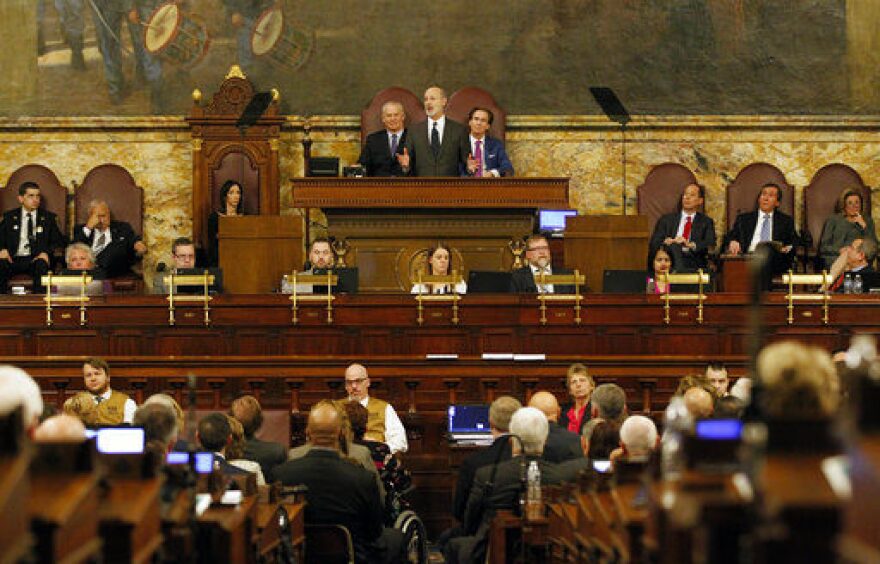HARRISBURG (WSKG) -- In the midst of a fraught battle over state congressional maps, and during an increasingly-heated midterm election year, Governor Tom Wolf has released his budget proposal for the 2018-19 fiscal year--the fourth and final one of his first term.
Much of it sounds familiar.
The plan includes little new spending or funding, and its most controversial components--a new natural gas tax and minimum wage increase--have been part and parcel of all Wolf's previous financial plans.
But one key thing sounds different from recent years: after a decade of tight state finances following the Great Recession, the administration is predicting some wiggle room.
Wolf spent a lot of time during his address to the House and Senate rehashing accomplishments--like a reduction in the state prison population, more spending on the opioid epidemic, and an overhaul of the state pension system.
He also took some digs at republicans after a session filled with bitter budget fights, which lasted until four months after the budget was due.
"When some in the legislature haven't mustered up the political will to work with me, I have no problem doing it on my own," Wolf said.
But for the most part, his vision for the 2018-19 fiscal year budget seemed aimed at appeasement.
It includes no broad tax increases, and would increase spending by a little less than $1 billion--or about three percent.
One of the bigger boosts is $225 million dollars in new education spending--a proposal that was fairly popular, even among spending-averse Republicans.
House GOP Leader Dave Reed said he was encouraged by "the focus on career and technical education and workforce development, and training our young folks for jobs that are going to exist in the future."
Wolf's plan would also take advantage of what is turning out to be the best revenue year Pennsylvania has had in a while.
Between this year and next, the governor wants to put about $18 million into the state's long-neglected Rainy Day Fund.
Senate Appropriations Chair Pat Browne said this is a solid starting place, but noted, Republicans are a little suspicious of the proposed spending increase.
"The only thing that can put us at risk right now, as we try to pull ourselves into more fiscal stability, is overspending," he said.
Other issues for Republicans?
Senate Majority Leader Jake Corman said Wolf's $12-an-hour minimum wage hike probably won't fly.
Neither will the severance tax on natural gas drillers--despite the fact that Corman's caucus voted in favor of a severance tax last year.
The difference is permits. The version of the tax package Senate Republicans support would also make it significantly easier for companies to get environmental permits--in part by outsourcing state permitting powers to third-parties.
"When he proposed the severance tax he did not propose the permitting reform," Corman said. "So I think it's highly unlikely, despite his encouragement, that that will get accomplished this year."
Matthew Knittel, director of the state's Independent Fiscal Office, said without the tax there will be about a $250 million hole that will have to be cut down or filled with other revenue.
A notable exception to the conciliatory tone struck by most Republicans was House Speaker Mike Turzai, who is running to unseat Wolf this year.
Amid calls for charter school funding and a work requirement for Medicaid recipients, Turzai harshly criticized the governor for last year's deficit.
"We are not going to go through those same shenanigans in this budget," he told reporters. "It will not be acceptable."
Because it's an important election year, a number of lawmakers expressed a desire to finish this budget quickly, and without the extended bickering of recent years.
Though many also noted, anything could happen.

